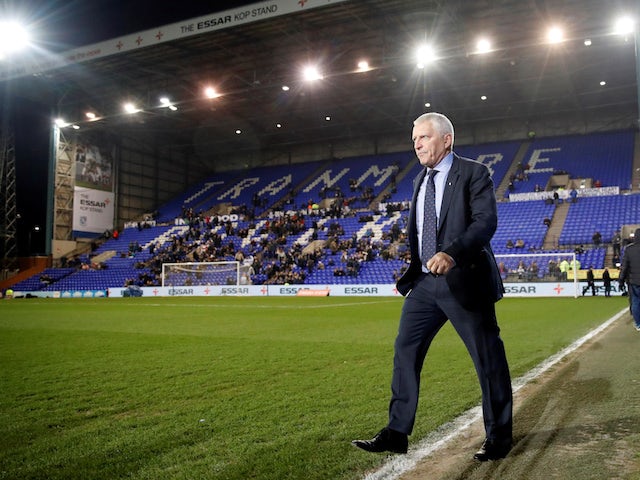The EFL should look to tap into a FIFA fund set up to assist those leagues and clubs struggling financially due to the coronavirus crisis, according to Tranmere chairman and former Football Association chief executive Mark Palios.
The Professional Footballers' Association, the Premier League and the English Football League are due to continue talks on Wednesday with a view to finding common ground on the issue of player wage deferral, with Palios describing a collective agreement as "absolutely essential" in order to safeguard the football industry in England.
On Tuesday the world governing body announced it intended to utilise its reserves to help leagues, teams and players at every level that had been left in financial difficulty by the outbreak, with competitions across the world suspended as a result of a ban on mass gatherings.
Football stands united, pass the message and follow these five steps to kick out the coronavirus #WeWillWin #FIFA #WHO #COVID19 / https://t.co/ehCuDkobZg pic.twitter.com/ykDOq9gh7y — COSAFA (@COSAFAMEDIA) March 31, 2020
Palios, who is part of the EFL's financial working group set up to look at solutions to tackle the impact of the Covid-19 outbreak, told the PA news agency: "The purpose of the exercise is to ascertain the size of the financial hole in the industry and then to find the sources of funds and ensure that every club is maximising that. If FIFA has raised some kind of fund like this, then yes we would like to get our fair share of it into the EFL."
FIFA confirmed its intention to help, with a spokesperson saying on Tuesday afternoon: "FIFA is in a strong financial situation and it's our duty to do the utmost to help them in their hour of need.
"Therefore, we confirm FIFA is working on possibilities to provide assistance to the football community around the world after making a comprehensive assessment of the financial impact this pandemic will have on football.
"The exact format and details of this assistance are currently being considered and discussed in consultation with FIFA's member associations, the confederations and other stakeholders, having in mind that a decision needs to be agreed and announced in the near future."
EFL clubs have, in some cases, opted to furlough non-playing staff under the Government's job retention scheme set up to combat the financial impact of the pandemic. Under the scheme, employees whose normal work has been impacted by the coronavirus outbreak are paid 80 per cent of salary up to a maximum of £2,500 a month.
📰 Chairman @markpalios1 has provided the following update.#TRFC #SWA — Tranmere Rovers FC (@TranmereRovers) March 31, 2020
Tranmere have furloughed some non-playing staff, but have committed to ensuring they are paid in full for March and April.
"With the furloughing, it is not surprising that no one has got an understanding of the absolute mechanism of payment yet, so we might still have to find the actual cash to pay the wages in April, and wait until May to get the money back," Palios said.
"We just don't know when that furloughing cash will come back into the hole. If you're looking at the funding deficit, one of the means of filling it in April would be a deferral of players' wages. The question is the extent of the deferral – what is the size of the cash hole by league and by club?"
On deferrals, PFA chief executive Gordon Taylor has told the PA news agency that his union is looking to put a task force in place which protects clubs and players.
For clubs in the EFL the loss of matchday revenue has created cash flow problems already, with the league having released £50million to its clubs earlier this month in a bid to ease the immediate pressure.
Palios believes the most effective way to tackle the problem will be for the EFL, Premier League and PFA to find an agreement.
"As far as I am concerned a collective agreement on wage deferral is absolutely essential," he said.
"That's part of the work that the EFL financial working group is undertaking to get this collective picture of the industry. It better identifies the choke points in the collective cash flows, and it gets all the relevant stakeholders – the Premier League, the EFL, the PFA etc – all on the same page.
"They can then see what the reality is – what the cash deficit is and where the potential funding can come from. There has to be an industry-wide solution, there has to be an industry change, and what this enables us to do is move from a negotiation to co-operation sooner rather than later."
Certain clubs have already reached agreement with players over a wage deferral or discussed the possibility of wage cuts, and Palios says those clubs were well within their rights to do so.
"Some clubs have gone out to fix wage deferrals and furloughing, and that's quite legitimate, but what we're trying to do is to collate all of that and get an industry-wide response for the greater good in the longer term."








